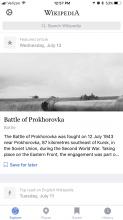Reading web is developing a spec for the new summary API.
@phuedx has documented the current spec here:
https://www.mediawiki.org/wiki/User:Phuedx_(WMF)/Reading/Web/Page_Preview_API
Reading Infrastructure should review the spec and ensure there are no major issues about the proposed changes. Apps Tech Leads should also take a quick pass in case anything is missing or breaking.
Note: Some there items will be added in regards to titles (see T164291) as well as structured information about disambiguation pages. Also the notion of "type" is still being worked on.
